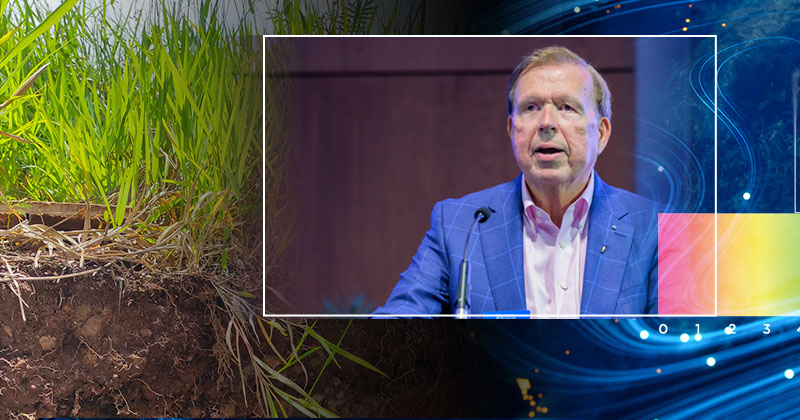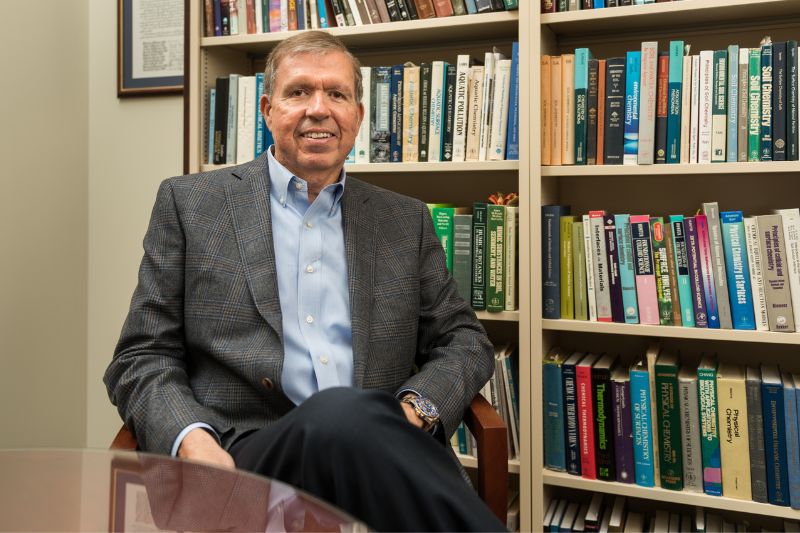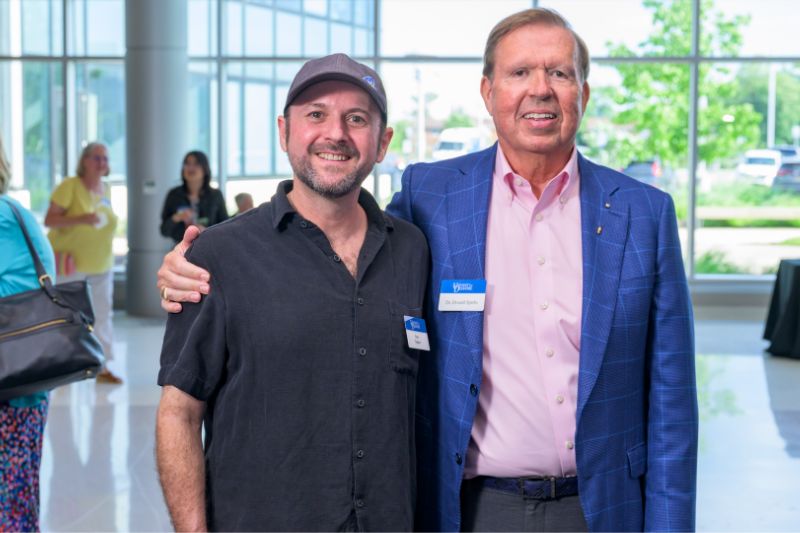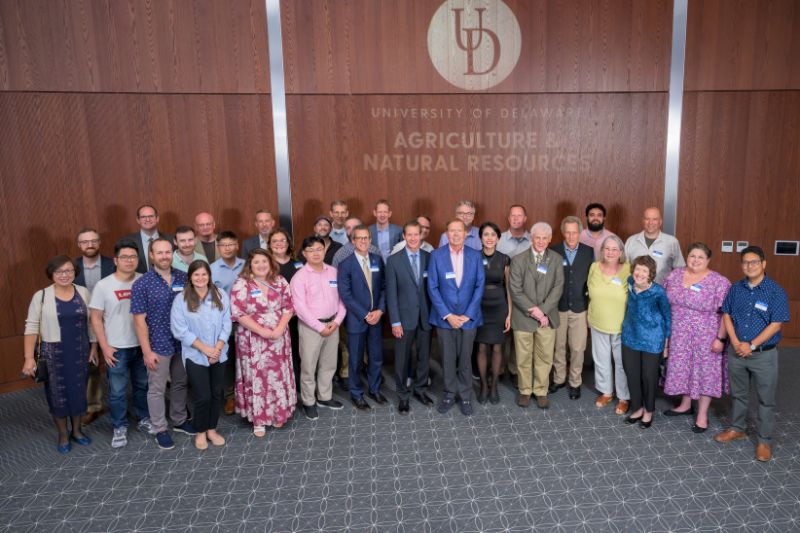


Geochemistry pioneer
Photos by Evan Krape July 01, 2025
Donald Sparks’ University of Delaware career honored internationally
Earlier in his 45-year University of Delaware career, Donald Sparks was working with the DuPont company to understand how nickel, a toxic metal, reacts with clay minerals found in soils and sediments.
Sparks, Unidel S. Hallock du Pont Chair in Soil and Environmental Chemistry emeritus, and one of his postdoctoral researchers found in a laboratory experiment that nickel and zinc, under proper environmental conditions (for example, pH) could form surface precipitate phases on soils and clay minerals which strongly bind the metal to the surface.
“These results suggested that the metal might not to leach into water and could be less available to microbes,” said Sparks, recipient of UD’s prestigious Alison Award in 1996.
It was later found that the metal phases also occurred in contaminated soils. Through multiple years of research by a number of graduate students and postdoctoral researchers, Sparks’ group found that once the phases formed and aged, the sequestered metals were so tightly bound that even soil microbes could not transport the metals back into the environment. This research offered a way to naturally attenuate the metals such that costly soil remediation could be mitigated and water quality could be sustained.
The work with DuPont, which Sparks began in the late 1980s, set the stage for the next 25 years of lab-based soil science research. It enabled Sparks and his lab to receive continuous funding over a long period, supporting dozens of graduate students who came to work in his lab. It also allowed the research group to conduct fundamental research on an array of soil contaminants, which was applied to solve important environmental quality challenges.
Over the course of his illustrious UD career, Sparks was internationally recognized for his work regarding kinetics of geochemical processes, surface chemistry of natural materials, and how changing environmental conditions affect soils. Now retired, the founding director of the Delaware Environmental Institute and generous philanthropist continues to garner praise and accolades for the breadth of work he has done in his field.
In July, Sparks will be honored with the 2025 H.C. Urey Award, the highest award from the European Association of Geochemistry at the Goldschmidt 2025 Conference, July 6-11 in Prague. The award is given annually to someone who has made outstanding contributions to geochemistry during their career. Sparks is the first soil scientist to receive the award.
“I was very surprised,” Sparks said. “It’s a great honor.”
Advancing soil science
Sparks is renowned for pioneering the application of kinetics to soils as well as being one of the first soil scientists to use synchrotron radiation (intense X-rays) to determine how metals such as nickel, chromium, and arsenic and nutrients like phosphorus bind to soils and what the form of the metal is on the soil surface.
This information is critical in determining how mobile and toxic elements in soils are. Colleagues at DuPont were instrumental in assisting Sparks and his group with their early studies using synchrotron radiation at Brookhaven National Laboratory.
“The use of synchrotron radiation was a game-changer,” Sparks said. “It was the smoking gun. You could get the kind of information about how metals bind to soils and what their composition or species is. It was difficult to get that data any other way. Plus, you can do these studies with wet samples. Once you had that understanding and data, it was hard for anybody to argue with you.”
The last 15 years of Sparks’ career focused heavily on carbon in soils using advanced synchrotron techniques to investigate carbon-soil mineral complexation, which is a major way to stabilize soil carbon.
Sparks conducted carbon studies on temperate and permafrost soils to compare them. Soils are one of the major sources of soil carbon, and a large part of soil carbon is stored in permafrost soils which are melting.
“Our objectives were to find out if the carbon binds in permafrost soils the same way it does in temperate soils,” Sparks said, “and to understand what happens to the carbon under melting conditions. If we start losing more carbon from soils, it could exacerbate global temperatures due to increased greenhouse gases.”
This research is very relevant to Delaware and other areas in the Mid-Atlantic where sea level rise is occurring at a more rapid rate than many other parts of the world due to both climate change and subsidence (sinking of land).

‘A true scientific hero’
The international recognition of Sparks and his indelible impact through his soil science career has drawn praise from across UD and the broader geosciences community.
“Dr. Sparks exemplifies both the spirit and criteria outlined for the Urey Award,” said Brian Farkas, dean of the UD College of Agriculture and Natural Resources. “I’ve had the pleasure of meeting many of his past students and it is clear that Don’s success was not limited to the advancement of science. He was a keen mentor and is now a good friend and colleague to all. We are very proud and pleased to have Dr. Sparks recognized with this terrific distinction, the 2025 Urey Award.”
Andreas Kappler, a geomicrobiology professor at the University of Tubingen in Germany, has known Sparks and his research for a quarter century. He pointed to Sparks’ work quantifying geochemical processes such as the adsorption of ions to minerals, and analyzing the structure and identify of the interactions of ions with the mineral surface using complicated spectroscopic techniques as reasons that Sparks is a pioneer in his field.
Kappler co-authored a letter in support of Sparks receiving the 2025 Urey Award. Kappler said Sparks deserves the award for many reasons, including the many influential papers, book chapters and textbooks that he has published and his mentorship to students, many of whom are now renowned scientists.
“Overall, he is a pioneer, a leading scientist, and a great mentor,” Kappler said. “A true scientific hero.”
Kappler said the need for students to have a mentor is crucial, especially in soil sciences and geochemistry. Academia needs to train young scientists to protect the planet.
“Prof. Sparks is a role model in this regard,” Kappler said. “By training these young scientists and establishing them in academia, you build a scientific network of scientists in the next generation. Scientists who know each other, trust each other and work together because they come from the same ‘academic family’.”
Sparks, who retired from UD and the Department of Plant and Soil Sciences in June 2024, said the most satisfying part of his career was mentoring 65 graduate students and 35 postdoctoral researchers, and hosting approximately 30 visiting scholars and professors over the course of his 45-year career.
“It was a two-way street. They brought a lot to the table and I brought a lot to the table,” Sparks said. “I took so much pride in watching the students’ intellectual growth, their personal growth, and how their soft skills got so much stronger.”
He continued, “But what was the most exciting was to see them go out on their own and be successful.”
Sparks has watched with the utmost delight as students he mentored went on to work in careers with federal and state governments, academia, and the private sector.
One of the students Sparks mentored is Ryan Tappero, a doctoral graduate student who graduated from UD in 2008. Now at Brookhaven National Laboratory in New York, Tappero is a lead beamline scientist at a national synchrotron user facility. He said he would not be where he is today without Sparks’ guidance.

“Because Sparks was a pioneer in applying synchrotron capabilities to soils, and those in his research group had access to them and were part of that early movement, it really opened up new doors for elucidating the molecular scale mechanisms in soils,” said Tappero, who is also affiliated faculty in the UD Department of Plant and Soil Sciences since 2015.
Tappero continued, “We need to understand the mechanisms before we can make predictive science. So it really did, I think, open up opportunities to understand and explore soil chemical reactions at the mechanistic level.”
To this day, Sparks sees the continued legacy of his UD soil sciences program. His students have formed a family-like bond. Not a week goes by that Sparks doesn’t receive a call or an email from at least one of them.
And not only does Sparks keep in touch with UD alumni, he stays in the loop about new developments and questions in soil science. Sparks said climate change and extreme weather patterns such as flooding, sea level rise, and wildfires can cause variations and declines to soil health, and as a result, affect human health.
“I think it is a golden period for soil science and environmental soil chemistry research and student training opportunities,” Sparks said. “Many of the global environmental challenges we face including flooding and sea level rise, water and air quality, drought and wildfires, food insecurity, environmental sustainability, and national and international security are closely linked to soils and many of the challenges of direct impacts on human health.”
Sparks said soil chemistry affects all of humankind, from the food we eat to infrastructure to national and international security. With many UD alumni that he has sent off to the world to continue working on soil sciences, he hopes to continue to see progress made in this field.

Contact Us
Have a UDaily story idea?
Contact us at ocm@udel.edu
Members of the press
Contact us at mediarelations@udel.edu or visit the Media Relations website

